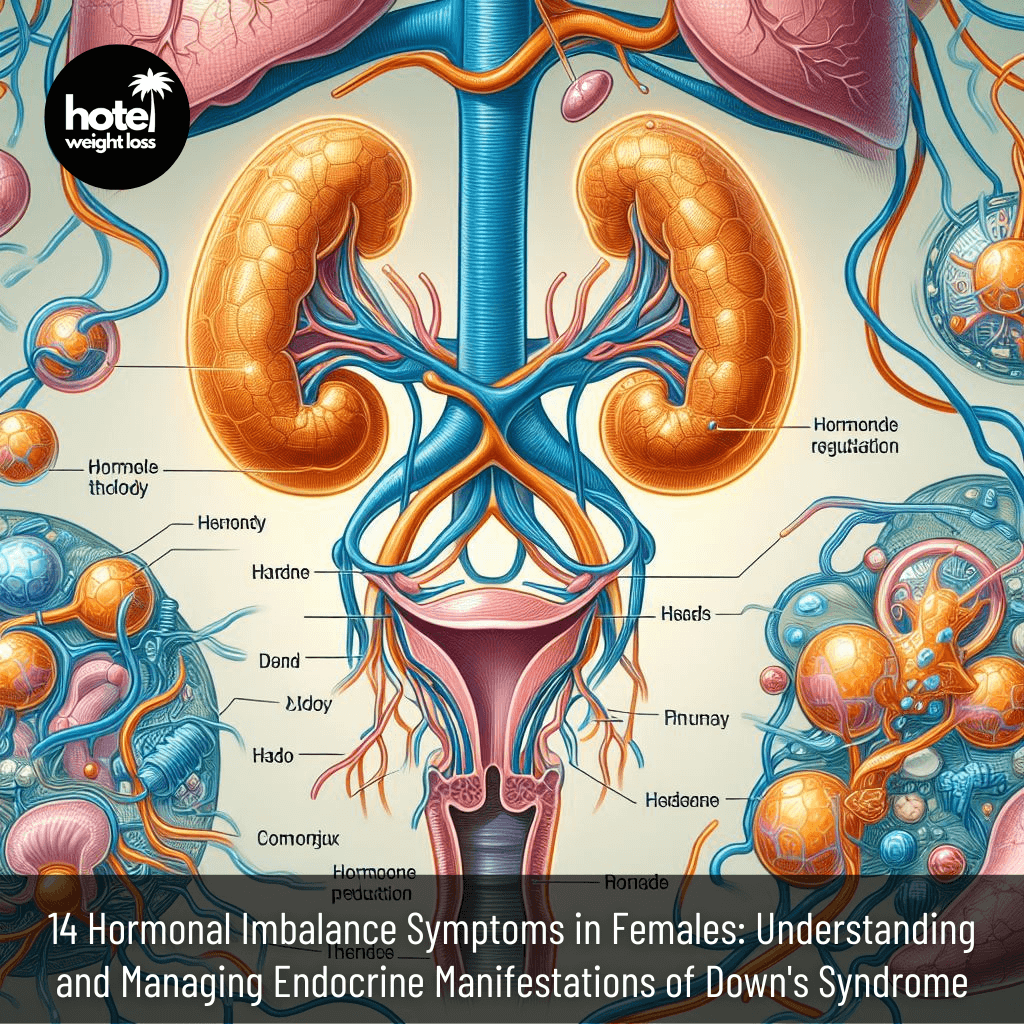Hormonal equilibrium is a fine thread that runs through all facets of human health’s unique design. However, this balance frequently encounters particular difficulties for people with Down’s Syndrome, resulting in a wide range of endocrine symptoms. Welcome to an investigation into the intricacies pertaining to hormonal imbalance symptoms in females diagnosed with Down’s Syndrome. As we explore this complex subject, we would like you to picture the path toward comprehending and controlling these expressions, which will ultimately lead to better health and energy.
Critical Takeaways
- Hormonal balance poses particular complications for those with Down’s Syndrome.
- Effective management requires an understanding of hormone imbalance symptoms in females.
- Innovative keto diet plans catered to the demands of each individual are offered by Hotel Weight Loss.
Table of Contents
The Impact of Down’s Syndrome on Hormonal Imbalance Symptoms
Hormonal imbalance symptoms in females with Down’s Syndrome present a multifaceted challenge encompassing various endocrine systems. The interaction of hereditary variables and physiological mechanisms adds to the complexity of these symptoms, which range from insulin resistance to thyroid dysfunction.
Thyroid Dysfunction and Down’s Syndrome
Thyroid dysfunction stands as a prominent feature among endocrine manifestations in individuals with Down’s Syndrome (Whooten, Schmitt, & Schwartz, 2020). Particularly common is hypothyroidism, which is characterised by insufficient production of thyroid hormone and manifests as hormonal imbalance symptoms in females like fatigue, weight gain, and cognitive impairment.
Insulin Resistance and Metabolic Syndrome
Insulin resistance, a hallmark of metabolic syndrome, is another significant concern for individuals with Down’s Syndrome (Whooten, Schmitt, & Schwartz, 2020). This resistance to the effects of insulin on glucose metabolism highlights the significance of preventive management techniques by placing a person at risk for type 2 diabetes and cardiovascular problems.
Growth Hormone Deficiency and Stunted Growth
Growth hormone deficiency often accompanies Down’s Syndrome, contributing to stunted growth and developmental delays (Whooten, Schmitt, & Schwartz, 2020). Early detection and intervention through growth hormone therapy can mitigate these effects, fostering optimal growth and development.
Puberty and Reproductive Health
Navigating puberty and reproductive health poses unique challenges for females with Down’s Syndrome (Whooten, Schmitt, & Schwartz, 2020). Delayed puberty, irregular menstrual cycles, and fertility issues may arise, requiring specialised care and support tailored to individual needs.
Managing Hormonal Imbalance in Females with Down’s Syndrome
While hormonal imbalance symptoms in females with Down’s Syndrome present significant challenges, proactive management strategies can enhance quality of life and mitigate associated risks. A comprehensive approach is essential for optimising health outcomes, from medical interventions to lifestyle modifications.
Medical Interventions and Therapies
Medical interventions play a pivotal role in managing hormonal imbalance symptoms in females with Down’s Syndrome (Whooten, Schmitt, & Schwartz, 2020). From thyroid hormone replacement therapy to insulin-sensitising medications, targeted treatments aim to restore hormonal balance and alleviate associated symptoms.
Lifestyle Modifications and Dietary Considerations
Lifestyle modifications, including dietary adjustments, exercise regimens, and stress management techniques, are fundamental aspects of managing hormonal imbalances in females with Down’s Syndrome (Whooten, Schmitt, & Schwartz, 2020). Embracing a balanced diet rich in nutrients and regular physical activity can promote metabolic health and overall well-being.
Supportive Services and Community Resources
Accessing supportive services and community resources is vital for individuals with Down’s Syndrome and their families (Whooten, Schmitt, & Schwartz, 2020). From specialised healthcare providers to advocacy groups, these resources offer invaluable support, guidance, and empowerment in navigating the challenges associated with hormonal imbalances.
Hormonal Balance and Emotional Well-being
Achieving hormonal balance goes beyond physiological parameters, encompassing emotional well-being and psychological resilience (Whooten, Schmitt, & Schwartz, 2020). Cultivating a supportive environment, fostering self-esteem, and promoting social inclusion are integral components of holistic care for females with Down’s Syndrome.

Innovative Solutions for Hormonal Balance and Weight Loss
In the pursuit of hormonal balance and weight management, innovative solutions offer promising avenues for individuals with Down’s Syndrome. Hotel Weight Loss, a pioneering wellness retreat, combines expertise in ketogenic diet strategies with personalised support to optimise health outcomes.
The Keto Diet and Hormonal Balance
The ketogenic (keto) diet has become a powerful tool for promoting hormonal balance and weight loss (Whooten, Schmitt, & Schwartz, 2020). This low-carbohydrate, high-fat diet can improve insulin sensitivity, regulate appetite hormones, and enhance metabolic flexibility by shifting the body’s metabolism towards fat utilisation.
Personalised Approach to Wellness
At Hotel Weight Loss, we recognise that one size does not fit all regarding health and wellness (Whooten, Schmitt, & Schwartz, 2020). Our team of experts collaborates with clients to develop customised keto diet plans tailored to their unique needs, preferences, and health goals.
Comprehensive Support and Guidance
Beyond dietary recommendations, Hotel Weight Loss provides comprehensive support and guidance throughout the wellness journey (Whooten, Schmitt, & Schwartz, 2020). From personalised coaching sessions to immersive educational experiences, we empower individuals with the knowledge and tools to achieve lasting transformation.
Embracing a Healthy Lifestyle
At the heart of Hotel Weight Loss lies a commitment to empowering individuals to embrace a healthy lifestyle for long-term success (Whooten, Schmitt, & Schwartz, 2020). We foster holistic well-being and sustainable weight management through a combination of nutritious cuisine, physical activity, and mindfulness practices.
Facts and Figures
Find below Table 1 from the original medical journal article showing a comparison of studies evaluating bone formation and resorption in Down’s Syndrome.

Credit: https://www.ncbi.nlm.nih.gov/pmc/articles/PMC6382276/table/T1/?report=objectonly
Conclusion
Balance is critical to unlocking vitality and wellness in the intricate dance of hormones. For females with Down’s Syndrome, navigating hormonal imbalance symptoms in females requires a multidimensional approach encompassing medical interventions, lifestyle modifications, and supportive services. As we embark on this journey towards hormonal balance and weight management, Hotel Weight Loss stands as a beacon of hope, offering innovative keto diet solutions tailored to individual needs. Contact us today to discover how we can help you overcome the challenges and embrace a healthier, happier life.
FAQs
-
What are the common hormonal imbalance symptoms in females with Down’s Syndrome?
Hormonal imbalance symptoms in females with Down’s Syndrome include thyroid dysfunction, insulin resistance, growth hormone deficiency, and reproductive health issues (Whooten, Schmitt, & Schwartz, 2020).
-
How can medical interventions help manage hormonal imbalance in females with Down’s Syndrome?
Medical interventions such as thyroid hormone replacement therapy and insulin-sensitising medications are crucial in restoring hormonal balance and alleviating associated symptoms (Whooten, Schmitt, & Schwartz, 2020).
-
What lifestyle modifications are recommended for managing hormonal imbalance in females with Down’s Syndrome?
Lifestyle modifications, including dietary adjustments, regular exercise, and stress management techniques, are essential for managing hormonal imbalances in females with Down’s Syndrome (Whooten, Schmitt, & Schwartz, 2020).
-
How can supportive services and community resources aid individuals with Down’s Syndrome in managing hormonal imbalances?
Accessing supportive services and community resources, such as specialised healthcare providers and advocacy groups, provides invaluable support, guidance, and empowerment in navigating the challenges associated with hormonal imbalance (Whooten, Schmitt, & Schwartz, 2020).
-
What role does emotional well-being play in achieving hormonal balance for females with Down’s Syndrome?
Emotional well-being and psychological resilience are integral to achieving hormonal balance for females with Down’s Syndrome, encompassing factors such as self-esteem, social inclusion, and a supportive environment (Whooten, Schmitt, & Schwartz, 2020).
-
How does the ketogenic diet contribute to hormonal balance and weight loss?
The ketogenic (keto) diet promotes hormonal balance and weight loss by shifting the body’s metabolism towards fat utilisation, improving insulin sensitivity, regulating appetite hormones, and enhancing metabolic flexibility (Whooten, Schmitt, & Schwartz, 2020).
-
Can hormonal imbalance symptoms in females with Down’s Syndrome affect their fertility?
Yes, hormonal imbalance symptoms in females with Down’s Syndrome, such as irregular menstrual cycles and delayed puberty, can impact fertility. Individuals with Down’s Syndrome and their caregivers must consult healthcare providers for personalised guidance and support (Whooten, Schmitt, & Schwartz, 2020).
-
Are there specific dietary considerations to address hormonal imbalance symptoms in females with Down’s Syndrome?
Yes, adopting a balanced diet rich in nutrients is crucial for managing hormonal imbalance symptoms in females with Down’s Syndrome. Consulting with a healthcare provider or nutritionist can help tailor dietary recommendations to individual needs and preferences (Whooten, Schmitt, & Schwartz, 2020).
-
How does hormonal imbalance in females with Down’s Syndrome impact their emotional well-being?
Hormonal imbalance in females with Down’s Syndrome can affect emotional well-being, contributing to mood swings, anxiety, and depression. Building a supportive environment, fostering self-esteem, and accessing mental health resources are essential aspects of holistic care (Whooten, Schmitt, & Schwartz, 2020).
-
What role does Hotel Weight Loss play in supporting individuals with Down’s Syndrome in managing hormonal imbalance symptoms?
Hotel Weight Loss offers innovative keto diet solutions tailored to individual needs, providing comprehensive support and guidance throughout the wellness journey. Combining expertise in ketogenic diet strategies with personalised coaching and educational experiences, Hotel Weight Loss empowers individuals with Down’s Syndrome to achieve hormonal balance and sustainable weight management (Whooten, Schmitt, & Schwartz, 2020).
Ready to embark on your journey towards hormonal balance and weight loss? Contact Hotel Weight Loss today to learn more about our innovative keto diet solutions and personalised support services.
Also, see Luxury Weight Loss Spa: Unveiling the Secrets Top Strategies to Achieve Weight Loss Bliss
References
Whooten R, Schmitt J, Schwartz A. Endocrine manifestations of Down syndrome. Curr Opin Endocrinol Diabetes Obes. 2018 Feb;25(1):61-66. doi: 10.1097/MED.0000000000000382. PMID: 29135488; PMCID: PMC6382276.
de Graaf G, Buckley F, Skotko BG. Estimation of the number of people with Down syndrome in the United States. Genet Med 2017;19:439–47. [PubMed] [Google Scholar]
de Graaf G, Buckley F, Skotko BG. Estimates of the live births, natural losses, and elective terminations with Down syndrome in the United States. Am J Med Genet A 2015;167A:756–67. [PubMed] [Google Scholar]
Bull MJ, Committee on G. Health supervision for children with Down syndrome. Pediatrics 2011;128:393–406. [PubMed] [Google Scholar]
Hawli Y, Nasrallah M, El-Hajj Fuleihan G. Endocrine and musculoskeletal abnormalities in patients with Down syndrome. Nat Rev Endocrinol 2009;5:327–34. [PubMed] [Google Scholar]




